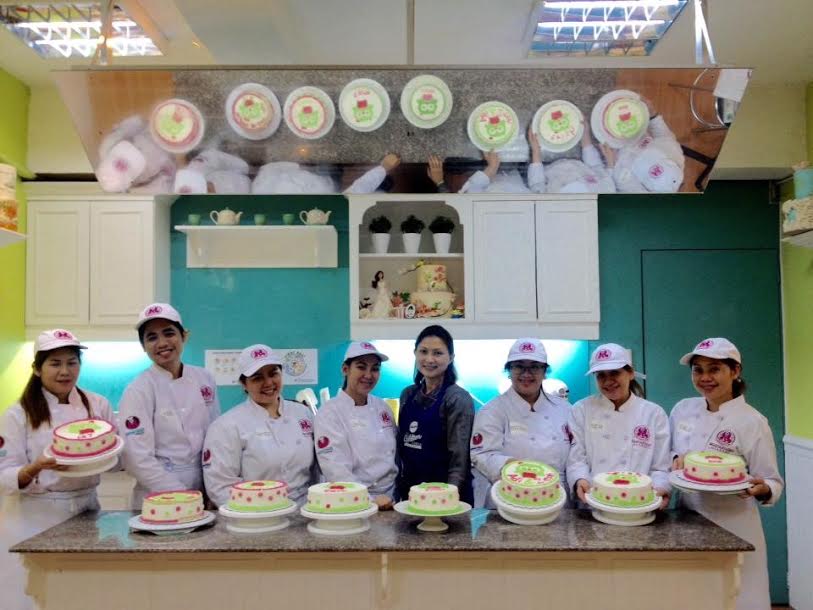
by rossanahead | Jun 19, 2020 | Recent Posts, Rossana Llenado, Smart Talk, woman
For most people around the world, 2020 is a year of stagnancy. Workers have lost their jobs, students have stopped going to school, and businesses have closed down. But for Ms. Rossana Llenado, founder and president of AHEAD – the leading and most awarded tutorial and review center in the Philippines, this year holds a lot of learning opportunities especially for Smart Super Women.
During her Facebook live seminar on June 18 – which garnered more than 51,000 views, 2600 comments, and 679 shares from different parts of the world – Ms. Llenado shared her views about different topics including life goals, marriage, family matters, education, mentorship, business, among others. She started her talk by introducing the 8 A’s of what a Smart Super Woman of today should be – alert, agile, adaptable, action-oriented, adept, agreeable, altruistic, and ahead-thinking. These characteristics are crucial in our wholistic growth as women especially if we want to become better individuals.
As a leader and visionary, Ms. Llenado highlights the importance of planning life goals in our success. According to her, the short-term goal at this time is survival. We have to make sure that we come out healthy and alive from this global pandemic. After that, we have to start thinking about our medium-term goals – whether that’s changing careers or improving our life in general. Lastly, we have to identify and move towards our end goal because everything we do should be of service to what we want to achieve in the end.
To become a Smart Super Woman, it is necessary for women to invest in themselves. This means exercising daily, making sure that we learn something new every day, finding a mentor, maintaining social connections, disconnecting from negative people, and always keeping the faith. Doing these things will mold and transform women into better versions of themselves especially at this time.
Being a woman is not an easy task because of the multitasking involved in our daily lives. A housewife is already a super woman given all the chores that she needs to finish every single day and a working mother is another kind of hero that we should all look up to. It is not an easy feat to do everything that’s why Ms. Llenado stressed that women should be kinder to themselves. Nobody is perfect and women especially, should never beat themselves for failing short of their expectations. Committing mistakes is normal and it doesn’t and will never make us less of a woman.
At the end of her talk, Ms Llenado emphasized that educators and parents should continue investing in their children’s education. South Korea and Singapore, two of the world’s most progressive economies managed to put their names on top because of their commitment to education. The current situation is not an excuse for students and for everyone to stop learning. For teachers and parents, this new normal is a challenge and also an opportunity to explore online learning channels such as AHEAD Alpha that offers online K-12, homeschool support, and assistance to schools that are transitioning to online.
It is true that the pandemic has changed our way of living. However, there are still many things we can do to transform the new normal into a “better normal.” It is not the time to be selfish with what we know. Rather, it’s high time for us to share our knowledge and be altruistic in our actions. For Ms Llenado, an altruistic act means doing more than what is expected from us. Now that schools have closed down, we can help parents and teachers by continuing to support students through different means of learning. As women, we can help other women grow and improve to become a Super Smart Woman for the better normal. Eventually, whatever good that we give out to the world comes back to us in tenfold. ∎

by rossanahead | Mar 8, 2017 | Existing Business, Recent Posts
 By Romelda C. Ascutia
By Romelda C. Ascutia
The Philippines is one of the top countries in the world in terms of the proportion of women holding senior management positions in business, according to a new global study by international professional services firm Grant Thornton.
Women business leaders account for 40% of the members of senior management teams in the Philippine corporate world, earning recognition for the country for its embrace of diversity, said the 2017 study entitled “Women in Business: New Perspectives on Risk and Reward,” released this March.
Along with the Philippines, receiving top marks as well for diversity in the workplace are Russia (with 47% of senior business leaders being women), Indonesia (46%), Estonia (40%), Poland (40%), and Lithuania (37%).
But in some nations, prospects for women in business are less bright. Among those cited for having male-dominated senior management teams are Japan (only 7% are female), Argentina (15%), India (17%), Germany (18%), Brazil (19%), and the United Kingdom (19%).
Globally, the report said, women now hold 25% of senior management roles at companies. This, however, is up by just one percentage point from 2016 and an improvement of only 6% since research began in 2004, Grant Thornton said in the report issued in conjunction with International Women’s Day.
On the other hand, the percentage of companies that have no female participation at senior level rose by a percentage point in 2017 to 34%.
“Globally, one in four senior roles is now held by a woman. This is a slight increase from last year. But the proportion of businesses with no women in senior leadership positions has also risen,” said the report.
Once again, it added, developing countries are leading the charge on diversity, with many major economies continuing to lag behind.
The Association of Southeast Asian Nations, or ASEAN, is the most diverse, with 36% of females in senior business posts, up from 34% in 2016.
In contrast, developed Asia-Pacific has a staggering 54% of business that had no women in senior roles, compared to only 13% of companies that did.
In terms of senior management roles, 23% of human resources directors worldwide are represented by women in 2017, unchanged from 2016. Female chief financial officers comprise 19% of total CFOs, down from 21% in 2016, while women chief executive officers rose to 12% this year from 9% last year.
Meanwhile female chief operating officers in 2017 are recorded at 9% from 8% in 2016; chief marketing officers have an 8% share of total CMO posts, a decline from 11% last year; corporate controllers 8% from 10%; and sales director 6% in 2017, a pullback from 8% in 2016.
According to the annual report, geopolitical and macroeconomic uncertainties are pushing diversity down the list of priorities for companies. “Leaders are concerned with reducing costs and retaining talent, relegating diversity to a nice-to-have rather than a must-have,” it noted.
The study said more needs to be done to level the playing field for women at all levels of the corporate ladder, emphasizing that diversity is key to business success.
“Diverse teams benefit from connections to a wider network, increased legitimacy among stakeholders and better decision-making,” said the report.
It recommended steps to have more diversity in leadership roles, such as implementing organization-wide changes, creating conductive environments, and sponsoring more women to climb the corporate ladder instead of only offering mentoring.
The findings for the 2017 report were based on a survey of 5,500 businesses across 36 countries conducted between July and December 2016.
Photo courtesy of www.BoldContentVideo.com
Featured Photo Courtesy of The Filipino Times

by rossanahead | Mar 7, 2017 | Recent Posts, Trainers
The Philippine Chamber of Commerce and Industry (PCCI) is holding a tax forum on March 10, 2017 from 12 p.m. to 5 p.m. at the Makati Shangri-La. For the program of the forum, entitled “Deepening Understanding of Package 1 of the Comprehensive Tax Reform Program (HBs 4774, 4688 and 4888),” click here.
Interested parties may call PCCI at (02) 846-8196 loc.110 or send an email to advocacy@philippinechamber.com.
Featured Photo Courtesy of Manila Bulletin Business

by rossanahead | Mar 1, 2017 | business, Business Tips, career, gender equality, Recent Posts
Times are definitely changing—for the better—for women. We can now aspire to be anything and everything we want to be, especially in the professional and business world, and we’re more likely to succeed too. Women have been elected president of a country, been named CEO of a conglomerate, become a much sought after motivational speaker or financial guru.
But, admittedly, it is still not easy for any woman who attempts to break the glass ceiling. The higher up the corporate or business ladder women go, the harder we’ll need to compete and prove ourselves in a still largely male-dominated world.
So how do you make it in a room filled with men? Here is a seven-point action plan you can adopt in your fight for recognition, promotion, or excellence in your chosen profession or industry.
Create a strategic plan. Don’t just passively wait to be noticed. Instead, map out a platform for success and then follow through with your plans. To find motivation, you can study the profiles and career trajectories of women achievers. For example, you can do research on Jessica Cox, a motivational speaker and pilot who was born without arms and who steers airplanes with her legs. Or look up the accomplishments of award-winning Dr. Josette Biyo, the executive director of the Philippine Science High School who has a planet named after her in recognition of her excellent body of work. In your own company, don’t hesitate to ask a close superior or director, both men and women, about their strategy as they moved up the corporate ladder.
Promote yourself. Think of yourself as a marketing expert who needs to introduce herself to a whole lot of people and who has to build relationships. Take on difficult challenges and risks to stand out and eventually get promoted. Consider also serving on board meetings to raise your visibility, and stay active in professional associations and search for leadership roles and responsibilities.
Be proactive. Don’t hinder your own growth by becoming complacent or content. Actively seek training, seminars, and workshops to keep learning professionally and improve your work or entrepreneurial skills.
Find work you enjoy. It may be a cliché, but doing work that truly gives you joy is half the battle. Look for a work culture that complements your strengths, limits your weaknesses, and is easier to endure in times of isolation. You are more likely to stay motivated in the face of gender-related hindrances when you are passionate about what you do.
Develop a plan to counter discrimination. Yes, intolerance still exists today, even in the workplace. Develop a plan to combat discrimination, but remember that not everything that may go against you is an attack on you, so choose your battles carefully. If you have trouble coping, it may be good to seek professional help or advice.
Have realistic expectations. Many women enter the workplace thinking that breaking new ground would be a breeze. When their expectations are not met, they give up or decide to settle for less. Learn to accept that not everything will go as planned, and prepare for setbacks by studying how you can stay strong as you strive to overcome opposition or failure.
Seek mentors. They need not only be your bosses or professional allies, mentors can also be friends and relatives of both sexes who have chalked up outstanding achievements. Look to them not only as individuals who can share their professional skills with you, but who can also introduce you to other people who can help you move ahead. – ED
Photo: UN Women

by rossanahead | Feb 26, 2017 | Existing Business, Recent Posts
For a Physical Therapy graduate to go into the culinary school business may seem unlikely, but as proven by Maggie Uy, it’s not impossible—if you believe in what you are doing and are willing to learn.
Maggie and husband Jan have successfully turned their Monster Kitchen Academy (MKA) from a kitchen studio within a retail baking store back in 2008 into one of today’s leading culinary and pastry schools in Northern Mindanao.
MKA may have been initially established to create a market for their existing Monster Kitchen Store, a retail outlet for baking supplies, but MKA’s eventual growth was driven more by a mission to improve lives.
“We noticed that the home bakers in Cagayan de Oro were so few and there was a need to develop a new breed of bakers,” Maggie explains.
Over the years, MKA has produced thousands of students and changed the landscape for the baking industry in CDO and in nearby towns.
“You will see how home-based baking businesses have evolved—there are pastry shops opening in every corner not just in the city but in nearby cities too and even as far as Davao, Zamboanga, and Tawi-Tawi. We also have students from Manila flying to Cagayan de Oro to study our baking and pastry arts programs,” shares Maggie.
Monster Kitchen Academy has two studio kitchens in CDO, one for baking and one for culinary, and in December 2016, it opened a new branch in Davao City.
Lessons and Challenges
Maggie, who handles the finance and course planning side of the business, admits she has had to learn along the way.
“With little background in handling a school, I was faced with so many challenges like handling the day-to-day nitty-gritty to dealing with different kinds of personalities,” she says.
Initially, company standards and systems were not yet set, making the learning curve very long, she continues. “It was only in the last few years that we started seeking help and hired consultants to guide us in systematizing things and up until now, we are still continuing to innovate and upgrade our standards so that our institution will be far advanced than the rest.”
Her lack of background in baking and cooking also posed challenges which she later overcame. “I had a hard time understanding the system flow of the school. I was familiar with ingredients but I didn’t have any idea about the school’s functions and all.”
To equip herself with enough knowledge, she enrolled with the first batch of their culinary school’s Baking & Cooking Program.
“It was then that I realized three things—what it’s like to be in this kind of industry, how the kitchen dynamics flows, and that there are a lot of things needed to be analyzed and given priority to in the operations,” says Maggie. “With all these, I decided to further enhance my skills and knowledge abroad to better equip me with the things I needed to sustain the business.”
Maggie enrolled in the Wilton Master Course in Chicago and had her Wilton Instructors training in Korea in 2015 and is now a Wilton-certified instructor, a distinction held by only a few in the Philippines.
Over the years, Monster Kitchen Academy has had its share of ups and downs. According to Maggie, growing the business requires being focused on what they’re doing and aligning their operations with the mission, vision, and values of the company. This enables MKA to continuously produce quality graduates, among them some of the biggest names in the country’s food industry.
Partners in Life and Business
Maggie shares the achievements of MKA with husband Jan, who oversees the academy’s direction and growth. “He is the brains behind the academy. He is the one that gives direction to the company. His insights are endless,” she says.
Having your life partner as your business partner has advantages and disadvantages, she states. “We can easily resolve business concerns by quickly addressing the problem without having to get the approval of any party. I can count on him anytime, especially when I encounter difficulty in handling a situation such as manpower and employee concerns.”
As for the downside, Maggie points to the tendency to bring work home and discuss it, which can be very draining and can sometimes lead to misunderstandings and arguments.
According to Maggie, their partnership works because they complement each other. “My weakness is his strength and vice versa.”
She also acknowledges Jan’s steadfast support. “He would always encourage me to attend trainings that are related to the business. He brainstorms with me on how to go about things, like bringing them to the next level.”
Expansion Plans
In the next five years, MKA is looking to continue expanding in order to “monsterize” more people and live up to its mission to improve lives.
Its core products are the Fundamentals in Baking and Pastry Arts and the Fundamentals in Culinary Arts. Also offered are the 12-day baking intensive program, the 12-day culinary intensive program, and a wide array of one-day or half-day lifestyle classes for hobbyists and first-time bakers.
At the helm of these programs are 16 chef instructors who Maggie says were mostly trained by international mentors and who are getting awards in various competitions.
“Running a school is an ongoing process. I give credit to our staff, instructors, and heads who have been working tremendously hard to pursue our mission. Hiring the right people and aligning them with our direction is the key factor in managing a culinary school,” says Maggie.
Asked for her advice to culinary arts students who plan to enter the food business, Maggie shares five tips that could well be the very guidelines she follows—love your craft, be ready to embrace failure, stay hungry for learning, stay grounded, and dare to explore.

by rossanahead | Feb 22, 2017 | Business Tips, Investment, Recent Posts
Whether we like it or not, emergencies happen, and often when we least expect them. But while we can’t always predict or prevent crises, we can definitely prepare for them in advance.
A tire that bursts, a home appliance that malfunctions, or a minor injury that needs immediate treatment may hurt but not deplete your purse. However, there are dire situations that can literally empty one’s pocket, such as a serious health issue, loss of employment, or a failed business venture. In these instances, an emergency fund will be most useful.
Randell Tiongson, a registered financial planner, wrote in his book No Nonsense Personal Finance that building an emergency fund is ideally done simultaneously with improving your cash flow (finding ways to earn more and spend less) and getting out of debt as much as your resources permit.
He adds that to build a proper emergency fund, it is essential to know just how much you actually spend in a month. Consider all your expenses, check your bills, and record your spending to get a good estimate.
The rule of thumb for creating an emergency allocation, he says, is to put aside an amount between three and six months’ worth of your monthly expenses.
“Three months is good, four months is better, five months will be great, and six months is excellent,” says Tiongson.
He adds that the most common reason to build an emergency fund is to cover a potential sudden loss of income. “I have given countless seminars to employees who went through retrenchment, and the common occurrence among them is that despite their stellar performance, they still lost their jobs,” adds Tiongson.
He also reminds people to exercise wisdom when determining what a real emergency is. “A 42-inch flat LED TV, a laptop, or designer bags and shoes that are on sale is definitely not an emergency—no matter how you justify it!” he emphasizes.
Here, Tiongson enumerates three good reasons to set up an emergency fund:
- To prepare. It is wishful thinking to say that you won’t be badly affected by crises in the future. As you get older, you’ll come across unplanned substantial expenses and bills that you will have to settle.
- To have peace of mind. Having an emergency fund will minimize your stress and worries when something untoward does happen.
- To reduce risks. With an established emergency fund, backed by life, non-life, health, and other insurance plans, you may be able to avert indebtedness or even total financial ruin in case of a major setback.
The good news is, as you plan ahead for adverse events that may happen in the future, you develop the skill for making sound decisions that will have a long-term benefit on your life. – Ruth Manimtim-Floresca
Photo: www.tradingacademy.com



 By Romelda C. Ascutia
By Romelda C. Ascutia


